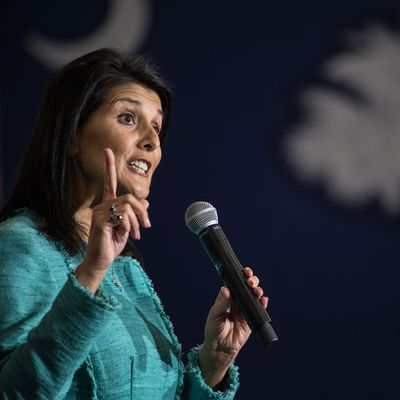
You don’t have to be a cynic or an enemy of Donald Trump to see his reported decision to make South Carolina governor Nikki Haley U.S. Ambassador to the United Nations as a transaction made in political heaven. He gets two-for-one diversity points for placing an Asian-American woman in a cabinet-level position, albeit one with no departmental responsibilities. He also supplies himself with an immediate and ongoing response to those in the international community who view his election as primarily a white-nationalist phenomenon. He’ll now have at least one major foreign-policy spokesperson free of the bullyboy machismo so many of his close associates (including possible secretary of State Rudy Giuliani) exhibit. For dessert, Haley’s elevation will make Trump’s most prominent early supporter in South Carolina, Lieutenant Governor Henry McMaster, the chief executive of the Palmetto State. And on top of everything else, it will probably please an important conservative personage in Washington: Heritage Foundation president Jim DeMint, who along with Mark Sanford once led the faction of the South Carolina Republican Party from whence Nikki Haley emerged to become governor in 2010.
It’s a perfect arrangement for Nikki Haley as well. She could become the Kellyanne Conway of Team Trump’s global interface, earning regular credit for softening and humanizing the Boss’s cruder and more dangerous pronouncements — someone Trump haters can praise as an exception who proves the general rule of his bad character and unsteady views. In the longer run, this highly telegenic 44-year-old pol who has already given her party’s response to the State of the Union Address and has made Veep short lists, will get the foreign-policy résumé line necessary to make her a national political figure for many years to come. I’d say the odds Haley will someday be a GOP presidential contender will go up to about 90 percent assuming she is confirmed for this very visible job.
The only problem with this arrangement is that Haley has no obvious qualifications for a major foreign-policy gig. Her entire international experience appears to be her overseas industry-hunting jaunts as governor, a necessary byproduct of her reactionary race-to-the-bottom approach to economic development, and no more an indication of cosmopolitanism than her uniquely shrill union-baiting. (I once observed she makes Scott Walker look like Eugene Debs when it comes to unions; she not only wants no private- or public-sector unions in her state, she has discouraged employers who tolerate unions from hiring in South Carolina as well.)
The official talking points for Haley’s appointment apparently refer to her “communications and problem-solving skills,” which could be read as an allusion to her perfectly timed announcement of opposition to the flying of the Confederate battle flag at the state capital in the wake of the racist massacre at a Charleston church last year. Without question, Haley preempted and largely defused what might have otherwise been a momentarily nasty confrontation over the issue in the South Carolina legislature. But the tributes to her great political courage in taking this long-overdue action are a bit over-the-top: Real courage was exhibited by a previous Republican governor of her state, David Beasley, who called for taking down the Confederate flag in 1997. For that matter, Georgia’s Newt Gingrich–supported Zell Miller made efforts to get rid of Confederate elements in that state’s flag in 1993.
But the flag flap did show that Haley has very good political instincts, which she earlier exhibited during her first gubernatorial run in 2010, when she turned (unsubstantiated) allegations of marital infidelity into an electoral asset by linking them to the good-old-boy Dixiecrat faction of her party, whose influence she was seeking to overthrow.
So it’s safe to say Nikki Haley understands Donald Trump’s political needs; presumably Team Trump either understands hers or does not care. It’s the kind of mutual-back-scratching arrangement that will likely characterize many of Trump’s interactions with the rest of the Republican Party.






























